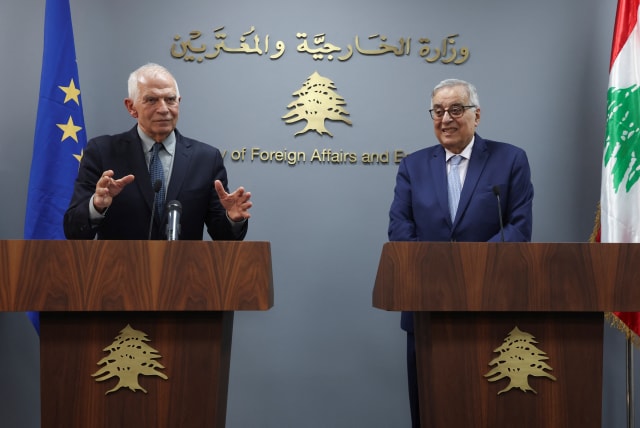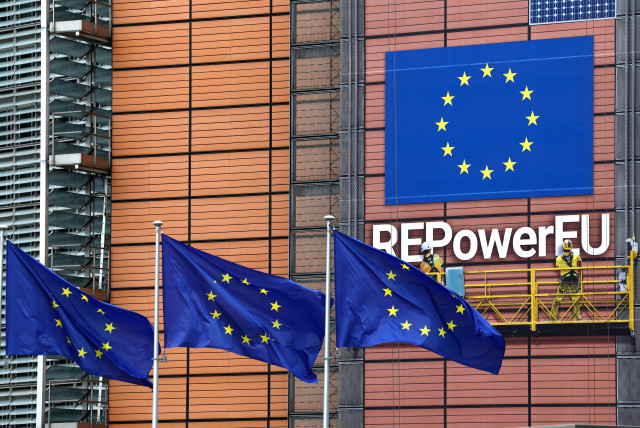Borrell threatens Israel on two-state solution, as EU begins road map talks

“I don’t think we should talk about the Middle East peace process anymore,” Borrell told reporters. “We should start talking specifically about the two-state-solution."
European Union foreign policy chief Josep Borrell on Monday called for an international peace conference to draft a road map for a two-state solution for Israel and the Palestinians.
Tools exist to pressure Israel into participating, he said.
“There is an initial draft for a peace plan that will provide robust security for Israel and the future state of Palestine,” Borrell said.
If that “proposal isn’t agreed [upon] then there is some leverage” to force Israel’s engagement, Borrell said.
Background on the meeting
He spoke after the EU foreign ministers’ monthly meeting in Brussels, which included an unusual set of back-to-back talks with their Middle East counterparts.
The visiting foreign ministers were Israel Katz of Israel, Saudi Faisal bin Farhan Al Saud of Saudi Arabia, Ayman Safadi of Jordan, Sameh Shoukry of Egypt, and Riyad al-Maliki of the Palestinian Authority.
The EU foreign ministers also spoke with Arab League Secretary-General Ahmed Aboul Gheit.
“I don’t think we should talk about the Middle East peace process anymore,” Borrell told reporters after the meeting. “We should start talking specifically about the two-state-solution implementation process.”
“Peace is a very general objective,” he said. “Everyone agrees on the need for peace. No one would say they are against peace. But here we are not talking about peace in general. Here we are talking about peace via a specific process.”
Now, the conversation should be about how to implement a two-state solution, Borrell said.
Attempting to implement a two-state solution
“That is what we are trying to achieve, [and] not everyone agrees on that,” he said. “Some are in favor; some are against... If Israel doesn’t want that solution, it will be difficult for them to take part in discussions to build that solution. But that doesn’t stop everyone else from doing that.”
Israeli opposition to Palestinian statehood was nothing new, Borrell said. “It has been against it for 30 years.”There are quite a few separate initiatives on the table, including from Arab nations and the United States, Borrell said, adding that the EU was moving forward on its own plan.
Ahead of the meeting, Borrell sent a discussion paper to the EU’s 27 member countries, suggesting a road map to peace in the broader Israeli-Palestinian conflict.
At the heart of the plan is a call for a “preparatory peace conference” to be organized by the EU, Egypt, Jordan, Saudi Arabia, and the Arab League, with the US and the United Nations also invited.
All EU members agree that this is the only viable solution that could guarantee peace and security for both Israelis and Palestinians, Borrell said.
“If Israel won’t agree to participate, that would be difficult, but it should not prevent the other countries from discussing it,” he said.
The EU would now start preparation for the international conference, Borrell said, adding that Europe has a “moral obligation” to do so. He declined to say whether a solution would be imposed on Israel by the international community.
All EU member states agreed that the priority was to expand humanitarian assistance, stop all Israeli military activity, and address the issue of the hostages held in Gaza, Borrell said.
“Less than 100, maybe 80 trucks are entering the Strip per day, compared with more than 500 before the war,” he said.
The Gazans were now facing famine, Borrell said. He had made this clear to Katz that it was urgent to increase humanitarian aid in Gaza, he said.
“The priority is to stop the bombing,” Borrell said, adding that he did not believe the war would bring security to Israel.
There was not unanimity at EU Council level to support a ceasefire, Borrell said.
Borrell criticized Katz for his presentation earlier in the day of a video showing two possible projects: one for a regional train infrastructure linking Israel with the Gulf states, and the other of an artificial island off Gaza shores.
“The minister could have made better use of his time at the council, talking about the security of his country,” he said.
The foreign ministers also discussed “sanctions against extremists and violent settlers in the West Bank,” Borrell said, and the “work is ongoing. I hope it will be approved by member states.”
Reuters contributed to this report.
Jerusalem Post Store
`; document.getElementById("linkPremium").innerHTML = cont; var divWithLink = document.getElementById("premium-link"); if (divWithLink !== null && divWithLink !== 'undefined') { divWithLink.style.border = "solid 1px #cb0f3e"; divWithLink.style.textAlign = "center"; divWithLink.style.marginBottom = "15px"; divWithLink.style.marginTop = "15px"; divWithLink.style.width = "100%"; divWithLink.style.backgroundColor = "#122952"; divWithLink.style.color = "#ffffff"; divWithLink.style.lineHeight = "1.5"; } } (function (v, i) { });

